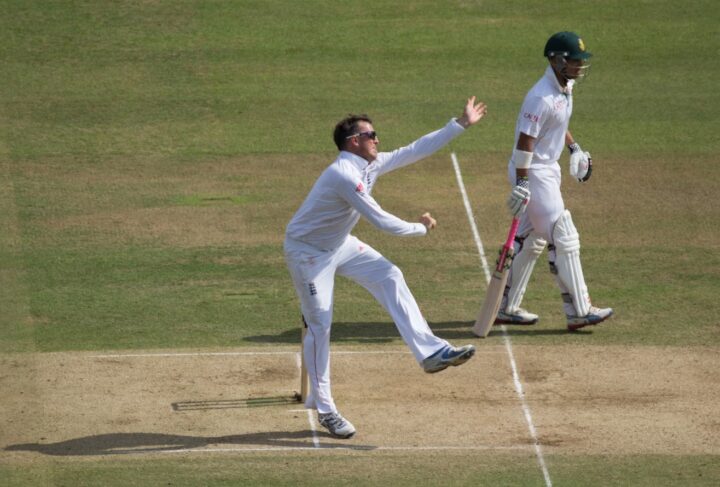Today new writer Ollie Phillips argues that England’s team selection during the T20 series displayed worrying signs of hubris.
Winning the World Cup in 2019 capped off an incredible turnaround of England’s white-ball fortunes. It was a watershed moment for the sport in this country and one that England fans will never forget – bar the odd moment made hazy by one libation too many.
Eoin Morgan’s team have become a tremendous limited-overs outfit, and they displayed some of their quality in the recent T20 series against India. But, amongst all the praise, did these five twenty-over games suggest that England have become a touch intoxicated by their unprecedented success?
England’s white ball skipper was granted his strongest possible squad, whereas Joe Root was deprived. Let’s not go there – you could argue all day about the ECB’s alleged betrayal of Test cricket, but what it did was give Morgan a golden opportunity to prepare for the T20 World Cup in India this October.
Team selection during the five matches was a real concern. Far be it from me to question our greatest white-ball captain, but watching India win the series and unearth fresh international talent, one could only think: “surely we’ve missed a trick here?”
It’s great that Morgan knows his best eleven, but this was a series for answering questions. You feel that by making just one change over five matches, England have left themselves with more unknowns than before.
Let’s look first at what we actually learned. Mark Wood is very quick. Jofra Archer is an excellent T20 cricketer. Jos Buttler and Jonny Bairstow bat brilliantly when the ball is white in colour. Forgive me, but I reckon even the most apathetic of England fans could have told you that a year ago.
Tongue out of cheek, England did show excellent progress in terms of taking early wickets, and Adil Rashid looks increasingly mature and dangerous with ball in hand. I also respect the desire to build a dynamic between England’s best eleven or twelve players, as stability can be a positive factor.
However, have England not mixed up their formats in this regard? After much talk of building a larger, competitive squad through rotation during the Tests, they ditched this philosophy completely for the T20s. Are stability and constancy of personnel not far more important in the Test arena?
When it comes to twenty overs per side, one could actually argue that consistency eventually becomes detrimental. It certainly did during this series. In the first and third T20Is, England were excellent with the ball and the top order comfortably chased modest totals. But by the fourth and fifth game there was an air of predictability about the side. India learned how to use the pace of Wood and Archer, and accessed the vulnerability of England’s secondary bowling options. In short, England lacked a plan B.
India, meanwhile, showed the importance of versatility. They brought in Ishan Kishan and Suryakumar Yadav, two huge ticks for the tournament in seven months’ time. As KL Rahul faltered, Kohli remedied the situation in the decider by shunting himself to the top of the order.
Losing the series is no shame whatsoever, but in each of Morgan’s post-match interviews he stressed the concept of learning lessons. Maybe the ‘strongest’ XI learnt about the rhythm of the game in these conditions but, as a whole, England’s approach contradicted Eoin’s outspoken desire to discover new things.
In not giving opportunities to Liam Livingstone, Sam Billings or Reece Topley, England will go into the World T20 without proven backups in Indian conditions. It is here where you could say they showed a touch of arrogance.
England are, I repeat, very strong in this format. But I don’t think they are quite as good as they think they are. They are certainly not good enough to disregard the importance of a plan B for October. Their failure to do so is particularly worrying in a year where hectic schedules and COVID bubbles render the likelihood of being able to pick your best XI fairly slim.
Stickling with the same team suggests to me that England believe they are the finished article. This mindset threatens a certain stagnation. Meanwhile, India’s talent mill – unique as it may be – whirrs on. Although England have reached the top of the T20 rankings, they will not stay there if they refuse to experiment and expand their squad.
T20 is developing at a faster pace than any other format. Unpredictability still plays a huge role in winning games. Having emerged from a limited-overs dark age with such grace, England risk collapsing back in on themselves if they do not build on their recent success. They simply cannot afford to miss such brilliant opportunities to innovate and grow as a group.
Ollie Phillips









A good take here, I agree that India have such a big talent pool that no other country has. Smaller nations have to just play their best side and hope. There is a lot of talk about this team being hard to get into but you should not make it hard to get out of. In the batting a few players are knocking on the door even though its competitive. In terms of all rounders they have Willey, Gregory, Woakes and Overton and although I want to get them in in favour of either Curran there isn’t the healthy competition the quality of the players listed would suggest. Bubbles play a big part in this of course but I think you could pick any discipline and say something similar England could put a competitive 3rd or 4th team out in white ball cricket nobody want loads of changes but it seems odd the low competition for places for the talent around. The issue with 20/20 and a world cup is that a result out of the blue is so much more likely to happen unlike any other format a singular person can win a game on their own, such performances in Tests and ODIs are much less likely but in 20/20 it happens much more often hence the focus on match ups.
Good analysis.
Putting the point in a somewhat broader context, I’d point to England’s WC winning teams in all sports have not become platforms for a preiod of dominance. The football team in 1966 and the rugby team in 2003 didn’t cope with success well. Both suffered from hubris, injuries and the successful method became ossified as if they believed an eternal template for success had been discovered. Both teams did reasonably well at the next tournament then went into steep decline with game skills and tactics that looked very dated. Cricket may be different (not least because there are so few other teams with much of a chance – for example SL are in danger of becoming worse than their Legends XI) but it’s a worrying pattern.
Of course it might help if the game in this country didn’t have a governing body whose greed and arrogance are legendary.
I agree with much of what you say although I don’t think the likes of India, Australia, New Zealand and the West Indies pose our biggest threat in the World Cup. At the moment, it’s the wilfulness (bloody-mindedness) and unquestioning attitude towards Eoin Morgan that will end all hope before the tournament even begins.
The white-ball leg of the India tour was the ideal opportunity to test out some of those players on the peripheries of the XI – Root, Billings. Evans, Clarke, Hales, Willey, Gregory, Livingstone, Parkinson, Lintoff, Briggs, Moriarty, Stone, Topley, Mahmood, Overton, Vince, Ball… Having said that, hands-up who’s certain of our best XI. I’m certainly not.
Instead, Morgan has played the usual suspects (with varying success) and left the players who are keen to break into the World Cup squad to watch from the sidelines. Absolutely pointless. Morgan says that the ODI’s will provide a good opportunity for others to stake their claim – for a place in a squad for a totally different format.
Since winning the World Cup, Morgan has been left to his own devices and given free reign. But rather than show his decisive, and somewhat ruthless, nature, he has continually shown loyalty to those who have toed his line and sunned themselves in his glow. As a result, with just a few months to go, we are not left with our 15 best players but a hotch-potch of Eoin’s mates.
So, what has the T20 leg of this tour taught us? Not much that we didn’t already know. Roy has found form, Bairstow and Buttler have re-affirmed their world credentials, Wood has proved himself a decent opening partner for Archer, who remains injury prone. Although Morgan seems to think that pace alone will suffice. But what if, as likely, one or the other gets an injury.
And if it needed demonstrating, what happens if one or two players get injured, become unwell or lose form. What have we got in the locker? To win a World, you must take a squad of world-class players, all of who have the talent and temperament to step on to the field whenever the call comes. Not what we have, which is half a dozen world-class players and a group who can be good on their day.
At the moment, you can probably pen in six or seven names – Roy, Bairstow, Buttler, Archer, Wood, Jordan and Rashid. Morgan only gets in because he’s captain. On his current form and scrambled brain, he wouldn’t even make the squad. So, that leaves seven places still up for grabs. Undoubtedly, there are some names which are ahead of others in the running for places but there also some who are not currently in the running but should be considered.
The only way we stand a chance of competing in the World Cup is by allowing a committee of selectors to choose a pool of 20 players to work together this summer. Take those 7 penned in names and start to build a squad around them based on need, talent and temperament, and not loyalty to the captain. As a captain, you shouldn’t care whether they agree with your every word. You should want a squad that will win your tournaments.
At the moment, I estimate that there are more than 25 players who all deserve a tilt at filling one of the remaining places. You may be able to add one or two more. Whether you like them or not, whether you think they deserve a place or not, they have all proved themselves worthy of consideration.
You only have to listen to his post-match interviews to see that Morgan is blinkered and deluded. If he is to be believed, there only remains a tiny bit of fine-tuning. Who’s he kidding? Since England (luckily) won the World Cup, his smile has become smugger to the point that he knows that he is untouchable. England white-ball cricket is not about him. And it’s time for Silverwood, Smith and Giles to start asking some difficult questions.
While vice-captain Buttler, Smith and Giles have all opened the door for Hales to make a return, Morgan remains blinkered by whatever injustice he seems to believe that Hales did him. Yes, he made a mistake. Yes, he took drugs. He paid the price by missing the world cup victory. He apologised, cleaned himself up and got on with setting the T20 world alight. He would walk into any other international team but not Morgan’s.
So, contrary to Morgan’s belief, we are still looking for a hard-hitting batsman, two batsmen you can build an innings around, a fast bowler, maybe an all-rounder, and probably two spinners (unless you take Moeen). But without being able to see them, it’s very difficult to tell how they’d perform in the heat of a world tournament. You’re choosing blind. What would you do?
ROY
BAIRSTOW
Top Order Batsman (Vince, Hales, Banton)
MORGAN
Middle Order batsman (Root, Billings, Clarke)
Middle Order batsman (Malan, Livingstone, Evans)
BUTTLER
Batsman/All-rounder (Stokes, Moeen, Curran S, Gregory)
RASHID
Spinner (Parkinson, Crane)
Spinner (Briggs, Dawson, Lintoff, Moriarty)
ARCHER
WOOD
JORDAN
FAST BOWLER (Willey, Topley, Stone, Curran T, Mahmood, Overton, Ball)
I’m not sure that ‘arrogance’ is the right word but England have always been a little intransigent over the years. The problem is that when you’re successful you tend to fall back on the things that made you successful. Morgan obviously likes and trusts the players in his XI, but it does seem a little shortsighted to believe that the XI he’s picking now will necessarily be his best XI come October. Changes are somewhat inevitable due to form / injury etc.
I really liked Ollie’s point re: predictability. I’ve always thought that variation and flexibility is key in T20. The best teams rotate their bowlers frequently so that the batsmen can’t get set. I wonder if this extends to personnel too? It would be great if England could find the odd joker up their sleeve.
The inflexibility seems to extend to the ODI team as well, England seem unable to pace themselves, instead they keep trying to launch every ball over for six. Morgan’s ‘This is how we play’ mentality is starting to aggravate me.
I wouldn’t say our 20-20 record is good enough to be arrogant. We’ve always had a terrific pool of batting talent, but at the same time this has been offset by our limited bowling resources. If we could have the Aussie seam attack then we would have a team to be arrogant about.
The present ODI series is affected by the absence of key individuals like Root and Archer, whereas India can pick from their best. Archer’s injury prone physique worries me, he’s built like a pipe cleaner and the sooner this obsession with rotation irrespective of form comes to an end the more settled the side will be. It’s good we’re fulfilling fixtures and keeping the game’s profile to the fore but I feel in the present climate the results don’t mean a great deal and I’n not just saying that because we’re on the wrong end of things at the moment. One fairly anonymous game blends into the next, even for fans of white ball. At this level that extra 10% of competitive edge and atmosphere the crowd brings to a contest is crucial to inspiring the best out of the players. It all looks a bit like a practice match at the moment. I know that’s not the players fault and they would probably deny it, but the view from the boundary is of a rather different hue.